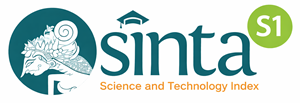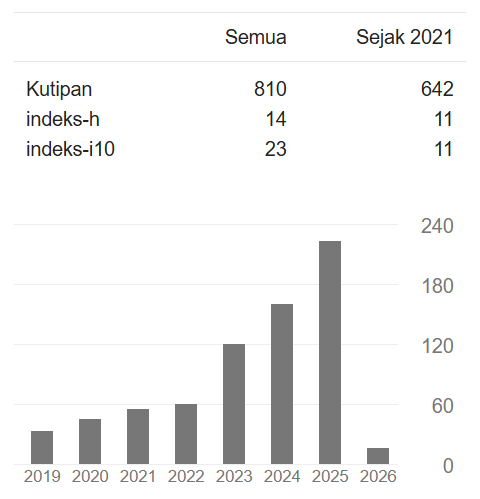AUGUSTE COMTE’S POSITIVISM
THE IDEA OF VALUE-FREE SCIENCE IN POSITIVISM ACCORDING TO THE ISLAMIC VIEW AND IT’S IMPLICATIONS FOR ISLAMIC EDUCATION
DOI:
https://doi.org/10.20871/kpjipm.v10i2.349Keywords:
Islamic Education, Law of Three Stages, Positivism, Value FreeAbstract
Islamic education encompasses not only worship but included in it is the aspect of using reason to understand God's creation and how the universe works. Science continues to develop and requires humans to be able to adapt to developments over time. Comte's positivist thinking can be linked to the context of Islamic education in giving rise to efforts to strengthen Islamic education. This research explores Auguste Comte's positivist thinking, compares it with Islamic values, and examines the potential of positivism for Islamic education. This research explores Auguste Comte’s positivism, contrasting it with Islamic values, and examines the potential of positivism for Islamic education. This research uses a qualitative approach, utilizing literature reviews from various relevant books and journals. This research ultimately produced findings that Comte’s positivism elevates the scientific method while sidelining metaphysical discussions, including religion. Key characteristics of positivism are value-free perspectives, phenomenalism, reductionism, naturalism, and mechanism. Comte proposed a “law of three stages” outlining human development from theological to metaphysical and finally to positivistic stages. While he did not advocate abandoning religion, he sought to separate science and religion. Comte's view of trying to separate science from religion is contrary to Islam's emphasis on religious values. Islamic education can adopt aspects of positivism by enhancing empirical and interdisciplinary studies. Also, prioritizing scientific and empirical inquiry in understanding phenomena to foster critical thinking and innovation within an Islamic education framework. Thus, integrating empirical, interdisciplinary, and scientific studies within Islamic education can enrich itself while maintaining its foundational values.
Downloads
References
Abdullah, M. Amin, Mulyadhi Kartanegara, Musa Asy’arie, Syamsul Anwar, Kuntowijoyo Kuntowijoyo, Mochtar Naim, Abdul Munir Mulkhan, Kamsul Abraha, Umar A. Janie, and Machasin Machasin. 2003. Menyatukan Kembali Ilmu-Ilmu Agama dan Umum. Yogyakarta: SUKA-Press.
Adhiguna, Baskoro, and Bramastia Bramastia. 2021. “Pandangan Al-Qur’an Terhadap Ilmu Pengetahuan dan Implikasinya dalam Pembelajaran Sains.” INKUIRI: Jurnal Pendidikan IPA 10 (2): 137–44. https://doi.org/10.20961/inkuiri.v10i2.57257.
Attas, Syed Muhammad Naquib Al-. 2001. Risalah untuk Kaum Muslimin. Kuala Lumpur: ISTAC.
Bettis, Pamela J, and James A Gregson. 2001. “The Why of Research: Paradigmatic and Pragmatic Considerations.” In Research Pathways: Writing Professional Papers, Theses, and Dissertations in Workforce Education, edited by Edgar I. Farmer and Jay W. Rojewski. Lanham: University Press of America.
Biyanto. 2015. Filsafat Ilmu dan Ilmu Keislaman. Yogyakarta: Pustaka Pelajar.
Bourdeau, Michel, Mary Pickering, and Warren Schmaus. 2018. Love, Order, and Progress: The Science, Philosophy, and Politics of Auguste Comte. University of Pittsburgh Press.
Bruhl, L. Levy. 1903. The Philosophy of Auguste Comte. London: Swan Sonnenschein & Co.
Burhanuddin, Nunu. 2018. Filsafat Ilmu. Jakarta: Prenada Media.
Comte, Auguste. 1880. The Positive Philosophy of Auguste Comte. Chicago: Belford, Clarke & Co.
Comte, Auguste. 1869. Cours de Philosophie Positive. Paris: J. B. Bailliere et Fils.
Dysmala, Emma. 2013. “Kritik Terhadap Paradigma Positivisme.” Jurnal Wawasan Yuridika 28 (1): 622–33. https://doi.org/10.25072/jwy.v28i1.59.
Einstein, Albert. 1954. Ideas and Opinions. New York: Crown Publisher.
Gojali, Nanang. 2004. Manusia Pendidikan dan Sains. Jakarta: Rineka Cipta.
Gould, F.J. 1920. Auguste Comte. London: Watts&Co.
Hardiman, Budi. 2012. Melampaui Moderenitas dan Positivisme. Yogyakarta: Kanisius.
Husaini, Adian, Syamsuddin Arif, Nirwan Syafrin, Ahmad Alim, Dinar Dewi Kania, Adin Armas, Nashruddin Syarif, Budi Handrianto. 2013. Filsafat Ilmu; Perspektif Barat dan Islam, Jakarta: Gema Insani.
Kankam, Philip Kwaku. 2019. “The Use of Paradigms in Information Research.” Library & Information Science Research 41 (2): 85–92. https://doi.org/10.1016/j.lisr.2019.04.003.
Kerlinger, Fred N. 1973. Foundations of Behavioral Research. New York: Holt, Rinehart, Winston.
Kesuma, Ulfa, and Ahmad Wahyu Hidayat. 2020. “Pemikiran Thomas S. Kuhn Teori Revolusi Paradigma.” Islamadina: Jurnal Pemikiran Islam 0 (0): 166–87. http://dx.doi.org/10.30595/islamadina.v0i0.6043.
Kuhn, Thomas S. 1993. The Structure of Scientific Revolutions. Chicago: Chicago Press.
Kumara, Ardi, Ayu Virnanda, Lathifah Sekar Azmi, and Rintik Rizki Auliani. 2020. “Implementasi Ilmu Pengetahuan dalam Perspektif Al-Qur’an Sebagai Upaya Menghadapi Tantangan Zaman.” Al-Afkar, Journal for Islamic Studies 3 (2): 111–633. https://doi.org/10.31943/afkar_journal.v3i2.113.
Mansir, Firman. 2020. “Diskursus Sains dalam Kurikulum Pendidikan Agama Islam di Sekolah dan Madrasah Era Digital.” Kamaya: Jurnal Ilmu Agama 3 (2): 144–57. https://doi.org/10.37329/kamaya.v3i2.437.
McVeigh, Ryan. 2020. “The Neurosociology of Auguste Comte.” Social Science Information 59 (2): 329–54. https://doi.org/10.1177/0539018420922759.
———. 2021. “Organism and Environment in Auguste Comte.” History of the Human Sciences 34 (3–4): 76–97. https://doi.org/10.1177/0952695120917908.
Mill, John Stuart. 1865. Auguste Comte and Positivism. London: N. Trubner&CO.
Muslih, Mohammad, 2016, Filsafat Ilmu, Yogyakarta: LESFI.
Mustofa, Mahmud Yunus, Nadhifah Nadhifah, Abdul Djamil, and Muhammad Faqih Irsyad. 2023. “A Critical Analysis of Auguste Comte’s Positivism for Islamic Digital Research.” Islamic Review: Jurnal Riset dan Kajian Keislaman 12 (1): 1–18. https://doi.org/10.35878/islamicreview.v12i1.681.
Muzaki, Yaskur Agil, Dwi Rizqi Amelia, Debi Sarianto, Mahfud Junaedi, Rifdah Sabrina, and Merri Yelliza. 2023. “Analysis of Auguste Comte’s Ideology: Positivism and Implementation of Islamic Education.” Suluah Pasaman 1 (2): 33–41. https://doi.org/10.70588/suluahpasaman.v1i2.133.
Nabawi, Nurnaningsih. 2017. Tokoh Filsuf dan Era Keemasan Filsafat. Makassar: Pusaka Almaidah.
Nugroho, Irham. 2016. “Positivisme Auguste Comte: Analisa Epistemologis dan Nilai Etisnya Terhadap Sains.” Cakrawala: Jurnal Studi Islam 11 (2): 167–77. https://doi.org/10.31603/cakrawala.v11i2.192.
Nurlisma. 2022. “Prinsip-Prinsip Pengembangan IPTEK dalam Perspektif Islam Serta Korelasinya dengan Pembelajaran Abad 21 dan Pendekatan Saintifik.” Jurnal Azkia: Jurnal Aktualisasi Pendidikan Islam 17 (1): 131–48. https://doi.org/10.58645/jurnalazkia.v17i1.175.
Rosika, Citra, Azmi Fitrisia, and Ofianto Ofianto. 2023. “Analisis Paradigma Filsafat Positivisme.” COMSERVA: Jurnal Penelitian dan Pengabdian Masyarakat 3 (06): 2464–73. https://doi.org/10.59141/comserva.v3i06.1033.
Suaedi, 2016, Pengantar Filsafat Ilmu, Bogor: IPB Press.
Sundaro, Hendrianto. 2022. “Positivisme dan Post Positivisme: Refleksi Atas Perkembangan Ilmu Pengetahuan dan Perencanaan Kota dalam Tinjauan Filsafat Ilmu dan Metodologi Penelitian.” Modul 22 (1): 21–30. https://doi.org/10.14710/mdl.22.1.2022.21-30
Wibowo, Setyo. 2013. “Permasalahan Iman: Kritik Atas Iman dalam Filsafat Barat dan Tawaran Jawaban.” Kanz Philosophia: A Journal for Islamic Philosophy and Mysticism 3 (1): 3–34.
Yahya, Harun. 2004. Al Quran dan Sains. Translated by The Translating Team of Hikmah Teladan. Bandung: Dzikra.
Zarkasy, Hamid Fahmi. 2008. “Makna Sains Islam.” Majalah Islamia 3 (4).
Downloads
Published
How to Cite
Issue
Section
License
Copyright (c) 2024 Yudha Okta Anuhgra

This work is licensed under a Creative Commons Attribution 4.0 International License.





























